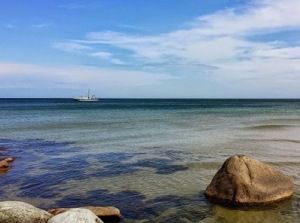News
International News in Brief: Denmark and Poland end 40-year Baltic border dispute
This article is more than 7 years old.
In other stories, Denmark is told to plug border gaps, there is enhanced co-operation with China and South Korea and human rights in Chechnya are under the spotlight

Felt across Bornholm (photo: pixabay/lennartkiil)
Following prolonged and intensive negotiations, Denmark and Poland have settled on the maritime border for the Continental Shelf and Exclusive Economic Zone between the two countries – bringing an end to four decades of argument concerning its exact delineation.
The new border runs south of Bornholm. The foreign minister, Anders Samuelsen, described the agreement as an “historic step that will create clarity in the area for the benefit of both parties.”
His Polish counterpart, Jacek Czaputowicz, added that “this very reasonable agreement will contribute to strengthening bilateral relations and co-operation between our two countries and will create legal clarity in the Baltic region.”
Danish border riddled with holes, EU report charges
If Denmark is to live up to its border obligations under the Schengen Agreement, it will have to toughen up on at least 64 points, claims a report from the Schengen evaluation committee sent to Parliament’s Europe Committee. It is particularly checks at airports and harbours that don’t live up to the rules, reports Berlingske. Amongst the urgent matters are police checks on pleasure boats, more face-to-face checks of employees and passengers on cruise ships and freighters, and ensuring that all border crossings have backup so suspicious persons can be checked further.
China and Denmark strengthen development ties
The minister for development co-operation, Ulla Tørnæs, is on an official visit to China to discuss co-operation and partnerships on a number of development issues. “In my meetings with my Chinese partners we will discuss our mutual wish to attain goals in areas such as equality for women, sustainable green growth, and possibilities for closer co-operation in aid development projects in Africa,” she said. The strategic partnership with China will also celebrate its 10th birthday. On the trip the minister has already met the president of the Asian Infrastructure Investment Bank and visited a joint Chinese-Danish project for cleaning wastewater.
Beefing up the UN Command in South Korea
The Danish government has decided to respond to a United Nations Command request by sending two more people to South Korea to assist in the border supervision work and mine-clearing in the de-militarised zone being carried out by United Nations Command. The UN request comes in the wake of September’s political agreement between North and South Korea that contains a plan to dismantle some of the watchtowers as well as clearing mines. “Denmark has a long tradition for supporting the UN’s efforts to stabilise the situation in the Korean Peninsula. We look positively on the recent agreement between North and South Korea and will gladly accede to the UNC request,” said the foreign minister, Anders Samuelsen.
Expert mission to examine human rights in Russia
Together with the OSCE, Denmark has set up an independent expert mission to investigate reports of severe human rights abuses in the Russian republic of Chechnya. The reports especially concern incidents involving LBGT people, journalists, lawyers and human rights activists. “Fundamentally, it is all about holding Russia responsible with regard to our common human rights obligations. We’ve seen credible reports about serious infringements of fundamental human rights in Chechnya – among other things homosexuals being tortured,” said the foreign minister, Anders Samuelsen. “These allegations should be thoroughly investigated and Russia has seemingly not done so.”










































